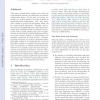53 search results - page 6 / 11 » An empirical framework for designing social products |
SDM
2012
SIAM
11 years 11 months ago
2012
SIAM
Multiple data sources containing different types of features may be available for a given task. For instance, users’ profiles can be used to build recommendation systems. In a...
AGILEDC
2009
IEEE
14 years 3 months ago
2009
IEEE
—The Scrum software development framework was designed for the hyperproductive state where productivity increases by 5-10 times over waterfall teams and many colocated teams have...
CSCW
2008
ACM
13 years 10 months ago
2008
ACM
In this paper we describe a study that explored the implications of the Social Translucence framework for designing systems that support communications at work. Two systems design...
ATAL
1999
Springer
14 years 26 days ago
1999
Springer
Multi-agent system research is concerned with the issues surrounding the performance of collections of interacting agents. A major concern, therefore, is with the design of the dec...
SCIENTOMETRICS
2010
13 years 3 months ago
2010
This paper quantitatively explores the social and socio-semantic patterns of constitution of academic collaboration teams. To this end, we broadly underline two critical features ...


